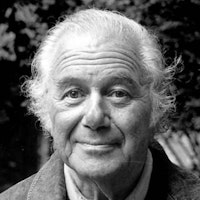One of the great purposes of the American nation is to shelter and guard the rights of all men and women to seek the conditions and the companions necessary for the inner search.
Jacob Needleman

The American Soul
Topic: Justice, Vision, & Leadership
“One of the great purposes of the American nation is to shelter and guard the rights of all men and women to seek the conditions and the companions necessary for the inner search.”
Jacob Needleman (born October 6, 1934) is an American philosopher, author and religious scholar. Born into a Jewish family, Needleman was educated at Harvard University, Yale University and the University of Freiburg, Germany. He is a professor of philosophy at San Francisco State University and is said to have "popularized the term 'new religious movements'." Needleman was honored by the New York Open Center in New York City in 2006.
The American Soul
Rediscovering the Wisdom of the Founders
The American Soul
Needleman, Jacob. The American Soul: Rediscovering the Wisdom of the Founders. J.P. Tarcher/Putnam, 2003, [Jacob Needleman, The American Soul Rediscovering the Wisdom of the Founders, 2002].

Jacob Needleman
Theme: A Vision of America
Copyright © 2017 – 2024 LuminaryQuotes.com About Us

The American Soul, Commentary by Parker J. Palmer (Excerpt)
The philosopher Jacob Needleman has written that “One of the great purposes of the American nation is to shelter and guard the rights of all men and women to seek the conditions and the companions necessary for the inner search.” He refers, of course, to the First Amendment’s prohibition of an established religion and the freedom of choice it assures us in our search for purpose and meaning. But we make a mistake if we think that religious institutions have a lock on influencing our “inner search. ” Educational institutions have at least as much impact, and arguably more, on our basic assumptions about what is real, possible. and meaningful.
Whether the subject is the human or the nonhuman world, we get much more than facts in the classroom. Consciously and unconsciously, we get images of ourselves (for example. as contestants in a win-lose competition or persons of unconditional worth) and images of the world (for instance, as “a war of all against all” or an interdependent community) that help form our inner lives. That is why it is lamentable, even tragic, that public education’s chance to play a positive role in the inner search that lies at the heart of being human has been crimped by an overly broad interpretation of the First Amendment’s prohibition of state-sponsored religion.
For fear of violating the rightful separation of church and state, we have imposed unnecessary limits on our schools when it comes to helping students deal with nondoctrinal inner issues–such as the nature of a “good life” and what it requires of us–that can make or break a democracy. Democracy loses when teachers feel they are skating on thin ice if they invite students to wrestle with questions such as those Rabbi Hillel famously asked “If I am not for myself, who is for me? If I am only for myself, what am I? If not now, when?” What questions could be more relevant to forming the habits of the heart that democracy requires, and by what standard do they violate the First Amendment?
― Parker J. Palmer [Healing the Heart of Democracy: The Courage to Create a Politics Worthy of the Human Spirit].
Additional Jacob Needleman Quotes
“The world needs to help America. It sounds strange, but America needs the goodwill of the world for its survival and for its role of sheltering the process of the inner search. This inner search can, of course, and will take place in other parts of the world — perhaps even better and more deeply than in the United States. But the preservation of a world order in which that search can take place depends for now on the success of America. Outer America has made the world safe for commerce; but in doing so, it must make the world safe for the inner America and the search for truth. It is called to sacralize this present world by keeping alive the external conditions and by protecting the inner attitudes that comprise the habitat of the growing human soul.”
― Jacob Needleman [The American Soul, Rediscovering the Wisdom of the Founders].
“This is the mark of great ideas: they unify people and they also act to unify the disparate parts of the human being; they speak of a social order that is possible on the basis of an ordering within the individual self.”
― Jacob Needleman [The American Soul, Rediscovering the Wisdom of the Founders].
“Labor to keep alive in your breast that little spark of celestial fire called conscience.”
― Jacob Needleman [The American Soul, Rediscovering the Wisdom of the Founders].